SAM-e is a safe and well tolerated nutraceutical supplement with minimal side effects. It is a useful antioxidant for many inflammatory disease processes including cancer. Veterinarians may recommend SAM-e for dogs when using other drugs that have negative effects on the liver such as non-steroidal anti-inflammatories and chemotherapy.
Key Takeaways
- SAM-e is a nutraceutical with potent antioxidant effects. It can aid the liver in detoxification and is helpful in combating inflammatory diseases including cancer.
- Human SAM-e can be used for dogs. Make sure there are no other additional ingredients that are not safe for dogs in human formulations. The dosage for SAM-e in dogs is 20 milligrams per kilogram per day which is about 225 mg per 25 lb.
- SAM-e will be absorbed quickly when given to your dog on an empty stomach. It may take some time to see the full antioxidant effects of SAM-e.
- SAM-e is often combined with milk thistle, another antioxidant, for a more powerful effect.
- There is strong evidence that SAM-e is a helpful addition to the treatment of liver disease, cancer and other inflammatory diseases in dogs. The most researched product is Denamarin made by Nutramax.
SAM-e for Dogs
SAM-e (sometimes spelled SAMe) is a safe and well tolerated nutraceutical supplement for dogs that has minimal side effects. Veterinarians may recommend SAM-e for dogs facing many inflammatory disease processes including liver disease and cancer.
It can be used in conjunction with drugs that have negative effects on the liver such as non-steroidal anti-inflammatories and chemotherapy.
The Role of S-adenosylmethionine (SAM-e) in the Body
It is important to understand how a supplement works before giving it to your dog.
Below are some facts about SAM-e:
- S-adenosylmethionine (SAM-e) is an endogenous molecule that is involved in metabolism. Endogenous is a word that means “naturally occurring in the body.”
- It is made from methionine which is an amino acid, a building block for protein.
- SAM-e is a precursor to glutathione, an important antioxidant.
- Glutathione is of particular importance to the function of the liver.
- The liver is responsible for metabolism and detoxification of many substances in the body.
- Given this, supplementation with SAM-e can aid in liver function and improve liver cell health.
- SAM-e aids in the production of cellular energy, neurotransmitters and hormones.
How SAM-e May Help Your Dog with Cancer
SAM-e can help support the body when it is faced with cancer because SAM-e is an antioxidant, a hepatoprotectant (liver protectant), and vital to normal cellular function.
Cancer stresses the body at the cellular level and many of the drugs used to treat cancer put a strain on the liver thus SAM-e can help mitigate some of that damage and stress.
There are not a lot of studies looking at SAM-e’s direct effect on canine cancer but there are studies in humans that show some promise.
SAM-e Helps Injured or Diseased Liver
It is known that SAM-e regulates hepatocytes (liver cells) and can decrease injury to the cells in diseases that stress the liver.
- In a mouse model study investigating colon cancer, SAM-e decreased messages that tell colon cancer cells to reproduce.1
- In a study looking at hepatocellular carcinoma (a type of liver cancer), it induced cell death of injured hepatocytes but protected healthy liver cells from cell death.2
- In hepatocellular carcinoma cell lines, it induced apoptosis (cell death).3
SAM-e Helps Protect the Liver During Chemotherapy
CCNU (a type of chemotherapy) commonly causes drug induced hepatitis and is often used as chemotherapy in dog cancer to treat lymphoma, mast cell tumor, and histiocytic sarcoma.
A study in dogs found that using SAM-e can be a helpful adjunctive treatment for chemotherapy induced hepatitis (liver inflammation). In the study, Denamarin was given in conjunction with CCNU.
The dogs receiving SAM-e had less liver enzyme elevation and had a better chance of completing the CCNU treatments than dogs not receiving SAM-e.7
Common Uses for SAM-e in Dogs
Common uses for SAM-e in dogs are:
- As an antioxidant and a hepatoprotectant.
- To support any disease process that stresses the liver such as hepatitis, cholangitis and gall bladder disease.
- To protect the liver when also administering drugs that stress the liver such as nonsteroidal anti-inflammatories or certain chemotherapies.
- To treat cognitive dysfunction in dogs (canine dementia).4
Safety and Side Effects
SAM-e is a very well tolerated medication with minimal side effects.
The most common side effect in dogs is gastrointestinal upset. This is more common when given on an empty stomach, which is preferred.
If your dog vomits when given SAM-e on an empty stomach, then try it with a small amount of food.
There is minimal data on pregnant and nursing animals so take caution in those animals.
Using SAM-e with Other Treatments
SAM-e can be given with most other medications and can be used with chemotherapy.
When to Not Use SAM-e for Dogs
Theoretically, SAM-e could increase serotonin when use with drugs that modulate serotonin. Some of those drugs are tramadol, trazodone, fluoxetine, selegiline, mirtazapine, dextromethorphan, and tricyclic anti-depressants like amitriptyline or clomipramine.
This is not often an issue but ask your veterinarian if you dog is on any of the above drugs before using Denamarin.
Dr. Nicole Sheehan explains why milk thistle helps so many dogs in her practice.
Where to Get SAM-e for Dogs
The most researched and reliable SAM-e products for dogs are Denamarin and Denosyl made by Nutramaxx.
Denamarin combines SAM-e with silybin/milk thistle (see link to milk thistle) as they both have supportive effects on the liver. Denosyl is SAM-e alone.
VetriScience, another veterinary nutraceutical company, makes a SAM-e product for both large and small dogs.
Both SAM-e and milk thistle products are also widely available for humans at health food stores. Human SAM-e can be given to your dog. If you purchase a human formulation, make note of the concentration so it is dosed properly. Also make sure you are purchasing the product from a reliable company that guarantees purity and that is free from unwanted chemicals or other additives.
The recommended dosage of SAM-e in dogs is 20 mg/kg/day which is equivalent to around 225 mg per 25 lbs. If your dog is in between tablet sizes round up to the closest tablet size. Always consult your veterinarian about the best dose of any supplement for your dog.
How to Give SAM-e for Dogs
Give SAM-e on an empty stomach 1 – 2 hours before feeding. Total daily dose can be given once a day or split into twice a day administration. Giving on an empty stomach increases bioavailability.
If vomiting occurs when given on empty stomach, then give with a small amount of food.
What If I Miss a Dose?
Give at the next scheduled dosing time.
Storage and Handling
Keep at room temperature and avoid high humidity. Please store it in an airtight or sealed container.
Our Take on SAM-e for Dogs
SAM-e is a useful supplement for dogs with liver cancer. It is also helpful in dogs with secondary hepatitis due to drugs used to treat pain and cancer. If your dog has senility, it may also be supportive. It is generally very well tolerated with minimal side effects. Green light on SAM-e!
- Chen H, Xia M, Lin M, et al. Role of methionine adenosyltransferase 2A and S-adenosylmethionine in mitogen-induced growth of human colon cancer cells [published correction appears in Gastroenterology. 2007 Nov;133(5):1747]. Gastroenterology. 2007;133(1):207-218. doi:10.1053/j.gastro.2007.03.114
- Lu SC, Mato JM. S-adenosylmethionine in liver health, injury, and cancer. Physiol Rev. 2012;92(4):1515-1542. doi:10.1152/physrev.00047.2011
- Plumb DC. S-Adenosyl-Methionine (SAMe). Plumb’s Veterinary Drugs. https://app.plumbs.com/drug-monograph/vTu5mODx1yPROD. Accessed November 25, 2022.
- Rème CA, Dramard V, Kern L, Hofmans J, Halsberghe C, Mombiela DV. Effect of S-adenosylmethionine tablets on the reduction of age-related mental decline in dogs: a double-blinded, placebo-controlled trial. Vet Ther. 2008;9(2):69-82.
- S-adenosyl-L-methionine (same): In depth. National Center for Complementary and Integrative Health. https://www.nccih.nih.gov/health/sadenosyllmethionine-same-in-depth. Accessed November 29, 2022.
- Sharma A, Gerbarg P, Bottiglieri T, et al. S-Adenosylmethionine (SAMe) for Neuropsychiatric Disorders: A Clinician-Oriented Review of Research. J Clin Psychiatry. 2017;78(6):e656-e667.
- Skorupski KA, Hammond GM, Irish AM, et al. Prospective randomized clinical trial assessing the efficacy of Denamarin for prevention of CCNU-induced hepatopathy in tumor-bearing dogs. J Vet Intern Med. 2011;25(4):838-845. doi:10.1111/j.1939-1676.2011.0743.x
Topics
Did You Find This Helpful? Share It with Your Pack!
Use the buttons to share what you learned on social media, download a PDF, print this out, or email it to your veterinarian.








